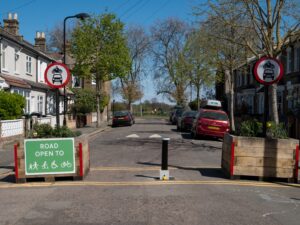Low-traffic neighbourhoods found to be popular despite criticism
A report by think tank Centre for London has shown that although low-traffic neighbourhoods (LTNs) are seen as divisive, more Londoners support rather than oppose them.
47% of Londoner are in favour of the quieter roads versus 16% who were against, while 37% were found to have no strong opinion or be unaware of them.
This trend was found across all genders, ages, educational backgrounds and party allegiances, with car owners more likely to support LTNs than people who didn’t own a car.
Planters, bollards, bans on turns and no exit signs are typically used in the implementation of LTNs, making for more pedestrianised areas.
The study, which used data on LTNs and testimony from professionals involved in their application, found they vastly increased cycling and reduced traffic in areas where they were in place.
Odessa Road in Waltham Forest saw the biggest impact, with a 172% increase in cycling and 61% decrease in traffic in the area.

Despite 42% of Londoners believing LTNs had little effect on traffic and displaced cars elsewhere, the study found this was not the case, with increased cycling and reduced car use found outside LTNs too.
Concerns about LTNs affecting emergency response times and increasing street crimes were also unfounded, according to studies included in the research.
Authors of the report said support should be given to people unable to switch to other forms of transport and recommended early, comprehensive public engagement to improve public trust in the schemes.
It was noted that LTNs can’t tackle car use alone and must be combined with street changes to incorporate cycle lanes and traffic calming required, as well as new public transport options and vehicle hire clubs.
The report suggested more charging measures be put in place, so drivers could be charged according to the distances they drive for parking at workplaces or in residential areas.
It also recommended councils be given more powers to raise funds for LTNs, increased government funding, more public engagement and maximised coverage of LTNs.
While the study focused on London, LTN’s have been put in place across the UK, in cities such as Manchester, Sheffield and Birmingham.
Photo by Matt Seymour







 Network
Network